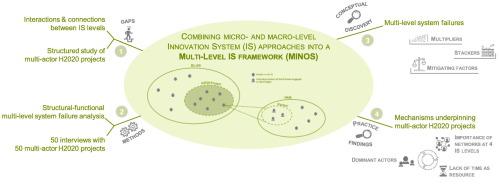Agricultural Systems ( IF 6.6 ) Pub Date : 2021-12-20 , DOI: 10.1016/j.agsy.2021.103349 Evelien Cronin 1 , Andrew Fieldsend 2 , Elke Rogge 1 , Thomas Block 3

|
CONTEXT
The key European Union (EU) policy instrument in support of innovation in agriculture, forestry and related sectors is the European Innovation Partnership for Agricultural Productivity and Sustainability. It applies the ‘interactive innovation model’ which brings together actors with complementary types of knowledge. This policy instrument is implemented inter alia through multi-actor projects funded via the Horizon 2020 (H2020) Research and Innovation (R&I) programme.
OBJECTIVE
Although the multi-actor H2020 projects account for a substantial part of EU project funding for agriculture, forestry and related sector R&I, systematic and comparative research on the multi-actor H2020 projects is scarce. This is partly due to a lack of a structured analytical approach to accommodate the differences in institutional, cultural and social contexts which influence the co-innovation and social learning processes in these multinational, multi-actor partnerships. To this end, we argue that the analytical integration of the micro- and macro-level innovation system (IS) perspectives is necessary to understand fully the mechanisms underlying the functioning of, and the co-innovation process within, multi-actor H2020 projects.
METHODS
This analytical gap is addressed with the development of an integrated, Multi-level Innovation System framework (MINOS) and its application to 50 multi-actor H2020 projects. MINOS recognises the presence, influence of and interaction between multiple levels of IS in such projects.
RESULTS AND CONCLUSIONS
We distinguish four levels of IS: the European Agricultural Innovation System (EU AIS), the National Agricultural Innovation System (NAIS), the H2020 project and the partner organisations involved in the project (Partner). Our analysis of the system failures that occurred across most of the 50 cases allowed us to identify and conceptualise two categories of ‘multi-level system failures’, namely multipliers and stackers, and the presence of mitigating factors.
SIGNIFICANCE
The MINOS analytical framework enabled a) a better understanding of the underlying mechanisms of co-innovation in multi-actor H2020 projects and b) contributed to addressing the theoretical and conceptual gaps in terms of studying the interconnection and interdependence of different IS levels.



























 京公网安备 11010802027423号
京公网安备 11010802027423号